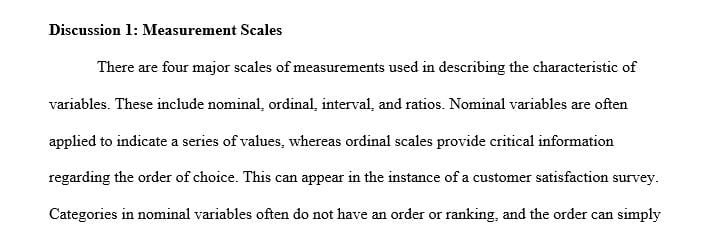What are the differences between the various scales of measurement
RES 5240 Week 3 – Discussion 1 Measurement Scales. Week 3 – Discussion 2 Hypothesis Testing
There are somethings you need to know about this discussions and please could you use some reference from the textbook and recommend sources from time to time.
Introduction: Apply Theory
During Week 3, we will be shifting the focus to provide an introduction to quantitative research methods.
In Week 3, you will focus on descriptive methods in quantitative research. Through this week’s readings and discussions you will explore the basics of statistical methods and the four types of measurement scales utilized in quantitative research, as well as examine hypothesis testing and how to minimize type 1 and type 2 errors. This week’s reading will help you build foundational knowledge about quantitative research and how to interpret data and make predictions about a population. You will also develop a comprehensive literature review on a topic of interest.
You should consider the following questions before and during the reading and assignments this week:
What are the differences between the various scales of measurement?
What types of measurement scales are associated with particular statistical methods?
What is the importance of hypothesis testing?
What is the difference between a null hypothesis and alternative hypothesis?
What are type 1 and type 2 errors and how can they be avoided or minimized?
Learning Outcomes
Upon successful completion of this week, students will be able to:
Differentiate between nominal, ordinal, interval, and ratio measurement scales. (Aligns with CLOs 2)
Explain the importance of hypothesis testing and the reasoning behind the statements of the null and alternative hypotheses. (Aligns with CLOs 1)
Describe the types of errors in hypothesis testing and how those can be avoided or minimized. (Aligns with CLOs 1)
Synthesize published articles in the form of a literature review. (Aligns with CLOs 3, 4)
Overview
| Assignment | Due | Format | Value | CLOs |
|---|---|---|---|---|
| Measurement Scales | Day 3 (1st post) | Discussion Forum | 3 | 2 |
| Hypothesis Testing | Day 3 (1st post) | Discussion Forum | 3 | 1 |
| Literature Review | Day 7 | Written Assignment | 10 | 3, 4 |
| Self-Check | Day 7 | Self-Check | 0 | N/A |
| Total | 16 | |||
Resources
REQUIRED TEXT
Malec, T. & Newman, M. (2013). Research methods: Building a knowledge base. San Diego, CA: Bridgepoint Education, Inc. ISBN-13: 9781621785743, ISBN-10: 1621785742.
Section 1.6: Writing a Research Proposal
Chapter 2: Research Design, Measurement, and Testing Hypotheses
Appendix: Example of a Research Proposal
REQUIRED REFERENCES
Ijalba, E. (2014). Using qualitative and quantitative methods to conduct research in parent education with immigrant families of children with autism spectrum disorders. London: SAGE Publications Ltd. doi: 10.4135/978144627305014533926
RECOMMENDED REFERENCES
Anderson, J. D. (2006). Qualitative and quantitative research. Available at http://web20kmg.pbworks.com/w/file/fetch/82037432/QualitativeandQuantitativeEvaluationResearch.pdf (Links to an external site.)
Park, J., & Park, M. (2016). Qualitative versus quantitative research methods: Discovery or justification? Journal Of Marketing Thought, 3(1), 1-7. doi: 10.15577/jmt.2016.03.01.1
Some more information the Professor put out today.
Learning how to write well in APA Style will be critical to your success in grad school. Your required 6th ed APA Publication Manual needs to become your best friend for any writing assignment here at UofR. The info in the manual is what you will be held accountable for in terms of writing standards.
Understanding that writing well in APA Style is a challenging process, I have developed &/or gathered a series of tools to help you be successful which I will post here for you. You will find that if you read & utilize these tools, you will get a better grade in this course (also found links in your week 1 guidance).
Please note that that magazines, newspapers, and most web sites (including wikipedia) are not academic sources and should not be used in your papers. Your papers for this course must use correct, peer reviewed academic sources. A “peer reviewed” journal is an academic journal you found through one of our library’s search engines. Academic journals are rarely found via web (google type) searches. Academic journals are NOT newspapers of any kind or any type of magazine you could pick up at the grocery store or Wal Mart. In fact, you would be hard pressed to find an academic journal in most book stores that sell magazines either.
While I am on the topic, Wikipedia is not an academic reference and should not be used in college level papers. Websites in general should be avoided as sources for your papers or Discussion Boards unless the assignment calls for looking for them. If you must cite a web site, always stick with very well known, well established, and credible national organizations such as the American Medical Association, American Psychiatric Association, American Psychological Association, American Counseling Association, National Association of Social Workers, or the American Association for Marriage and Family Therapists. If you are ever in doubt as to a source, please ask a trusted classmate or me about it.
Finally, we have a WONDERFUL writing center at UofR. I HIGHLY recommend the writing center tutors! Write your paper early, submit it to them & they will return it to you with feedback about how to get a better grade! I have never had a student use this service & walk away dissatisfied!
Answer preview to what are the differences between the various scales of measurement
APA
677 words



